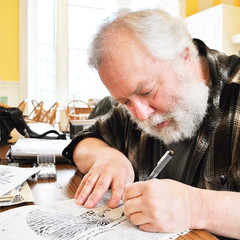By: Ali Campbell
On Tuesday, the Social Enterprise Institute Student Association (SEISA) and the Entrepreneurs Club (E-Club) kicked off the semester with a lecture from Liz Powers, the founder of the Boston-based social enterprise ArtLifting. ArtLifting works to help homeless and disabled individuals to sell their artwork through the sale of prints, original works and printed products. Liz was joined by two of the company’s artists, Scott Benner and Allan Chamberland, both of whom have been with the company since its start nearly two years ago and who have gained housing since its inception.

Liz began working with homeless populations, and in art therapy programs in shelters, while in college at Harvard. She recognized significant artistic talent in the programs, and yet artwork was constantly being discarded for lack of storage and resources in the shelters. Here Liz saw an opportunity to offer homeless artists a way out of homelessness- the art could be sold, thereby generating sustainable income for the artists, while also encouraging their often therapeutic artistic pursuits. Liz and her brother, Spencer Powers, began the company in 2013 with $4,000 in savings and the company has only grown since.
Scott and Allan discussed their respective experiences during the lecture. After a number of personal hardships and a diagnosis of Horner’s Syndrome, which left Scott was debilitating headaches and an inability to work his construction job; Scott was homeless and living between a Quincy-based shelters and the town’s woods. For Scott, who makes complex pen and ink pieces, his artwork was both an outlet as well as an opportunity to create meaning amidst his chaotic life. When a friend at the shelter mentioned ArtLifting, Scott got in touch with Liz and was quickly signed on as one of the company’s first artists. His work is now amongst the company’s most popular, and Scott recently moved to Maine where he’s working full time on his art.
Art serves a similarly expressive purpose for Allan, who despite physical disabilities that limit his financial opportunities has devoted himself wholly to his artwork. He makes stunningly intricate paper-cuts using a single piece of black paper, with subjects ranging from motorcycles to Boston architecture. Both artists described the role of ArtLifting in offering not financial benefits but also in helping them to share and sustain their passions.

Liz also described her experience as a female founder, and her experiences within the startup realm, as ArtLifting has been based between the Harvard i-Lab and the MassChallenge incubator. She cited the need for flexibility and the importance of experimentation in figuring out effective strategy for the company, especially given the underlying social mission and the desire to grow on behalf of the company but also the artists it serves. The company, which is largely e-commerce, has had the opportunity to display in longstanding gallery spaces and, more recently, a holiday pop-up store in the Cambridgeside Galleria.
As for ArtLifting’s recent accomplishments, the company has seen an increase in corporate sales for clients ranging from Microsoft to Staples; it recently partnered with the New England Patriots for a giving campaign on social media and was featured on the Today Show this past week.


